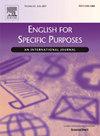Climate discourses of petroleum corporations in China and the United States: A comparative stakeholder analysis
IF 2.7
1区 文学
Q1 LINGUISTICS
引用次数: 0
Abstract
Although corporate climate discourse has been extensively studied, research has primarily focused on self-legitimisation and self-promotional strategies. How corporations engage with key stakeholders and balance competing priorities remains underexplored. By integrating stakeholder theory with corporate climate discourse, this study explores how American and Chinese petroleum corporations frame their climate discourses in relation to two key global and national stakeholders: the Paris Agreement and their respective national governments. Using a mixed-methods approach, this study conducts a quantitative thematic analysis of the Paris Agreement and national climate policies, followed by a qualitative thematic analysis of climate discourse from six leading petroleum corporations—Marathon Oil, ExxonMobil, and Chevron (U.S.) and CNPC, Sinopec, and CNOOC (China). Findings indicate that the Paris Agreement prioritises global engagement, development capacity and a formal, obligatory commitment to directives. China's policy discourse presents the government as a central orchestrator, actively guiding national policy within a global framework. Meanwhile, U.S. policy discourse focuses on addressing immediate climate crises and promoting environmental justice while emphasising the roles of various agencies. In response to these two key stakeholders, Chinese corporations align their discourse closely with the Paris Agreement, centring on two themes: ‘transition to sustainable energy management’ and ‘policy-driven climate strategy’. American corporations take a more delicate approach, balancing global commitment with business operations while demonstrating ‘selective policy support and active lobbying’ and ‘advocacy for market-driven carbon pricing’. This study concludes with a discussion of its academic contributions and practical implications for climate regulators, corporate communication students and practitioners.
中美石油企业的气候话语:利益相关者比较分析
虽然企业气候话语已被广泛研究,但研究主要集中在自我合法化和自我宣传策略上。企业如何与关键利益相关者互动并平衡竞争优先事项仍未得到充分探讨。通过将利益相关者理论与企业气候话语相结合,本研究探讨了美国和中国的石油公司如何构建与两个关键的全球和国家利益相关者(巴黎协定和各自的国家政府)相关的气候话语。本研究采用混合方法对《巴黎协定》和各国气候政策进行了定量专题分析,随后对六家主要石油公司——马拉松石油、埃克森美孚和雪佛龙(美国)以及中石油、中石化和中海油(中国)——的气候话语进行了定性专题分析。调查结果表明,《巴黎协定》优先考虑全球参与、发展能力和对指令的正式、强制性承诺。在中国的政策话语中,政府扮演着中心协调者的角色,在全球框架内积极引导国家政策。与此同时,美国的政策话语侧重于解决迫在眉睫的气候危机和促进环境正义,同时强调各机构的作用。作为对这两个关键利益相关者的回应,中国企业的言论与《巴黎协定》密切相关,围绕两个主题:“向可持续能源管理过渡”和“政策驱动的气候战略”。美国企业采取了更为微妙的方法,在全球承诺与商业运营之间取得平衡,同时展示“选择性政策支持和积极游说”以及“倡导市场驱动的碳定价”。本研究最后讨论了其学术贡献以及对气候监管机构、企业传播专业学生和从业者的实际意义。
本文章由计算机程序翻译,如有差异,请以英文原文为准。
求助全文
约1分钟内获得全文
求助全文
来源期刊

English for Specific Purposes
LINGUISTICS-
CiteScore
5.70
自引率
8.00%
发文量
41
审稿时长
62 days
期刊介绍:
English For Specific Purposes is an international peer-reviewed journal that welcomes submissions from across the world. Authors are encouraged to submit articles and research/discussion notes on topics relevant to the teaching and learning of discourse for specific communities: academic, occupational, or otherwise specialized. Topics such as the following may be treated from the perspective of English for specific purposes: second language acquisition in specialized contexts, needs assessment, curriculum development and evaluation, materials preparation, discourse analysis, descriptions of specialized varieties of English.
 求助内容:
求助内容: 应助结果提醒方式:
应助结果提醒方式:


